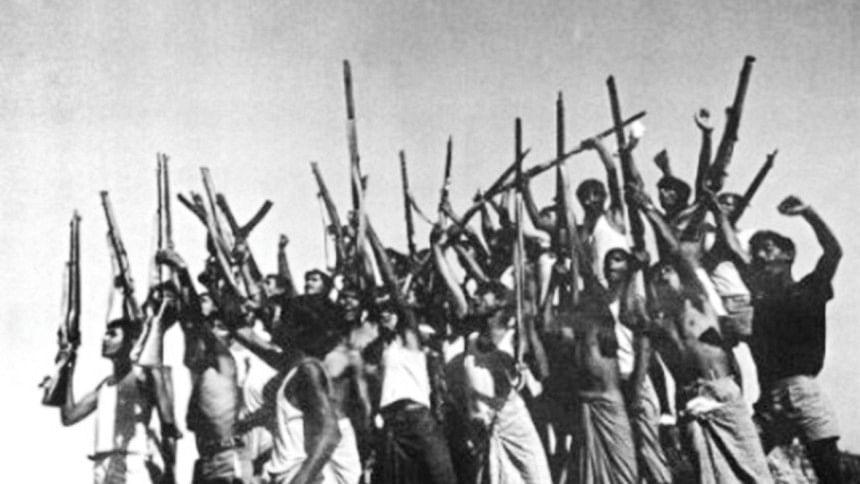Songs of Freedom

The Guerrilla
By Shahzaman Mazumder Bir Protik
pp 185; TK 350; Dhaka; Daily Star Books
We were ecstatic, jubilant. We were like children, firing our weapons in the air as if they were toys, we hugged each other, danced in wild celebrations, and our joys knew no bounds. Our country was finally free, independent, and we had thrown off the yoke of the Beast.
We, however, could not immediately leave Ashuganj and remained there until 22 December, when we left Ashuganj by boat for Narsingdi. A train was waiting for us at Narsingdi and we arrived in Dacca the same afternoon.
The Pakistan army was brutal and savage. They committed genocide against a people they had sworn to protect actually. If they thought this was 'East' Pakistan they were massacring the people of that 'East' Pakistan. This was because of a pathological hatred towards us. Literally, after 25 March 1971, the Pakistani Army could do anything in East Pakistan and did. There were no restraints. The atrocities committed surpassed all limits. Many people took up arms against the Pakistanis only because of their extreme brutality. During the nine months of the war, no Bengali in this land was safe from the Pakistanis or their collaborators. Even the lowliest of soldiers could kill a high-ranking Bengali with absolute impunity. There is also evidence that many senior commanders encouraged and commended their subordinates for such actions. Bengalis lived in constant fear of being imprisoned, tortured, killed or simply vanishing without a trace. And all suffered from persistent dread for their womenfolk. There are many recorded instances of Bengali women taken away to serve as sex slaves for officers and troops. Moreover, I have not come across a single record where any Pakistani military personnel were in court martial rather much less punished for committing atrocities.
From the perspective of any conventional army, the Mukti Bahini was a relatively ineffective fighting force, ill-trained and ill-equipped, thoroughly inadequate for any conventional engagements. Our equipment consisted mostly of small arms. We had virtually no indirect fire support (artillery). Even the mortars we had in our sector were without sights. We were so ill-trained that most of us did not even know the rudiments of basic infantry tactics. In most cases, we had to confront the enemy just after learning the basic operation of a simple bolt-action rifle. The only way we could fight was through hit-and-run tactics. We were not trained for conventional warfare. During the month of September 1971, regular Mukti Bahini battalions were formed. The duration of training was thoroughly insufficient for them to become effective fighting units. I have seen some of the Bengal regiments in action and their effectiveness was definitely not better than the irregular elements of the Mukti Bahini. The core of the Mukti Bahini consisted of the elements of the East Bengal Regiments that had revolted in March. Only these troops were familiar with the skills necessary to fight conventional wars. The second layer was provided by the former members of the East Pakistan Rifles (EPR). As the EPR was a paramilitary border security force, they were not versed in the skills of regular armies. The police and other ancillary forces such as Ansars, Mujahids, etc., were only different from the common people because of their knowledge of firearms. Moreover, without the support structure of conventional formations, even the troops of the Bengal Regiments were thoroughly ineffective as a fighting force. The officers of the Bengal regiments were not trained in fighting non-conventional wars. During the initial stages of the war (March-May), we attempted conventional warfare with the Pakistani Army, which proved largely unproductive, sometimes even disastrous. The situation was further complicated when novices like us joined the force. Instead of contributing to the effectiveness of the fighting formations, we were more like armed mobs. Moreover, our induction significantly diluted the effectiveness of the East Bengal regulars. Therefore, it's not surprising that in most of the face-to-face confrontations, we were no match for the trained professionals of the Pakistan army.
But in spite of these limitations, we went on fighting the Pakistanis. This was possible only because this was our country and we were fighting for our motherland.

 For all latest news, follow The Daily Star's Google News channel.
For all latest news, follow The Daily Star's Google News channel. 




Comments